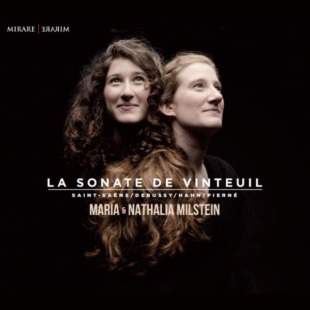
The Vinteuil Sonata on Mirare
with Nathalia Milstein piano
The Vinteuil Sonata has been nominated for the Edison Klassiek Public Award 2018.
Milstein is a big personality with her own very recognisable sound. This already makes her a rare breed in the violin universe. Her tone is full of nostalgia, depth and a certain fragility – reminiscent of the young Menuhin… There are no technical limitations. The sisters feel totally free to play as fast and as soft as they want. The result is breathtaking.
*****
Biëlla Luttmer, de Volkskrant, 10 November 2017
The programme of this CD alone deserves the highest acclaim. The theme is very intriguing, though it is rather the atmosphere of the “belle époque” that the Milsteins try to capture here rather than the solution to the Vinteuil riddle… violinist Maria, with her expressive tone and acute sense of line and direction, and her sister Nathalia, who supports flawlessly and with initiative from beginning to end. It is a pleasure to finally hear the Saint-Saëns Sonata given the serious attention that it deserves. It is absolutely not soggy madeleine-music, but powerful and pure nostalgia, as Swann and Proust experienced it a century ago.
*****
Peter van der Lint, Trouw, 10 November 2017
Maria and Nathalia Milstein confidently master all the technical challenges and are always searching for the lost melody in the spirit of these works, resulting in playing of rich and reflective tones. In the slow movements especially, Maria Milstein lets her violin breathe wonderfully so that, as Proust writes in his novel, one almost ‘has the illusion of hearing a singer.’
Bayerische Rundfunk, 9 November 2017
…handsomely performed…A charmer of a disc.
Graham Rickson, The Arts Desk, 4 November 2017
They inhabit this work and are attentive to every note and every detail of the score…The Milstein sisters possess an infallible virtuosity without ever being flashy. The second movement [of Camille Saint-Saëns’ Sonata for Violin and Piano No 1] is luminous, charming, expressive and graceful, with cut-diamond precision… This recital shows immense musical maturity and is a delight from start to finish.
****
Aurélie Moreau, Classica Magazine, November 2017
The salon-like intimacy of the balance between the violin and the piano is totally appropriate, and the transparent detailing of the textures seems effortless, too. It’s hugely enjoyable, however much you know about Proust.
****
Andrew Clements, The Guardian, 20 October 2017
Listen to excerpts from the disc here.
Watch Maria and Nathalie Milstein’s Reynaldo Hahn films here.
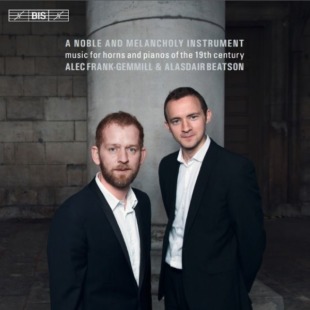
The Horn is a Noble and Melancholy Instrument on BIS
** Nominated for a 2018 BBC Music Magazine Award
There was a time when a recital featuring a number of different period horns and pianos would have almost certainly been an uphill struggle for both players and listeners. So to encounter a programme featuring some of the core works in the horn repertoire played on historically appropriate instruments with such effortless musicianship and technical ease really takes some believing… Frank-Gemmill and Beatson enter the fray with fearless alacrity, making even the most well-worn of phrases sound freshly minted.
Performance ***** Recording ****
Julian Haylock, BBC Music Magazine, July 2017
The changes of sound and technology are fascinating, but the programme and the playing are what really make this such an excellent recital – and the recording’s pretty good as well.
Andrew McGregor, BBC Radio 3 Record Review, 6 May 2017
Both notable performers on modern instruments, Alec Frank-Gemmill and Alasdair Beatson here revel in the sonic possibilities offered by the historic instruments with results that are as delighting as they are enlightening.
Presto Classical
All of which [the historical premise for the recording] is academically fascinating, but would be irrelevant if the playing of both musicians was not of such high calibre, virtuosic and technically flawless, but with real emotional depth. And such is the variety here, there is bound to be at least one piece that steals your melancholy heart.
Keith Bruce, The Herald, 31 March 2017
The logistical and organisational challenges must have been immense, but the musical results are glorious… Fiendish enough on a modern instrument [Schumann’s Adagio and Allegro], Frank-Gemmill’s fearless, colourful playing on an antique single horn paradoxically makes the piece sound easier. … As a bonus, the pair throw in a typically anachronistic piece of English fluff: Gilbert Vintner’s Hunter’s Moon was a favourite of Dennis Brain. Written as late as 1942, it’s an inconsequential delight, the sizzling handstopped notes a highlight. Unmissable, with Beatson an unfailingly sympathetic accompanist.
Graham Rickson, The Arts Desk, 15 April 2017
Listen to excerpts from the disc here.
Watch BBT’s Artist Profile film about Alec Frank-Gemmill and his four Insight films about each of the horns here.
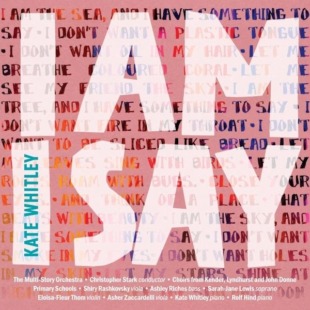
I Am I Say – NMC Composer Debut Disc CD
This debut portrait album showcases Whitley, who is not yet 30, as a lush harmonist, an orchestrator who handles instruments boldly… and a melodist who isn’t afraid of big rhapsodic elegies. The performances are direct and excellent.
Kate Molleson, The Guardian, 31 March 2017 Read the full review here.
This selection, expertly conducted by the orchestra’s [Multi-Story] other co-founder, Christopher Stark, is an excellent introduction to her sonic world… It culminates in I Am I Say, a tremendous work for primary school children and orchestra… It is darkened and deepened by complex but deftly organised instrumental textures that rise to an ecstatic climax… Capricious, yet cogent, Whitley’s music has admirably user-friendly surfaces that conceal hidden intensities. We will hear much more of her.
Richard Morrison, The Times, 18 April 2017
Make no mistake, Kate Whitley is a composer to watch.
Richard Whitehouse, Gramophone Magazine, May 2017
Alongside [Multi-Story Orchestra] there’s been another success story: that of Whitley’s own music… Here, NMC’s invaluable Debut Discs series provides a snapshot of a fresh and individual creative voice, sometimes still finding itself, often speaking clear and true. Like Britten and Maxwell Davies, Whitley values writing for local communities and for children. She’s clearly got the knack; the title track is a stirring look at our place in the natural world.
Rebecca Franks, BBC Music Magazine, May 2017
Listen to excerpts from the disc here.
Watch BBT’s Artist Profile film about Kate Whitley and this recording here.
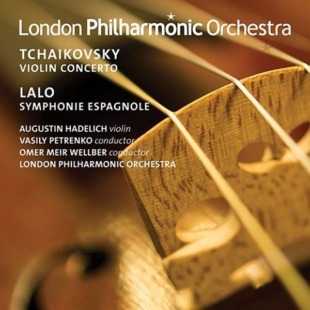
Tchaikovsky Violin Concerto and Lalo Symphonie espagnole on LPO LIVE
While his fireworks are terrific, it is his eloquent playing of the lyrical sections that makes Hadelich’s account of this warhorse [Tchaikovsky] stand out from the crowd. … If you are interested in an up-to-date recording of Lalo’s Symphonie espagnole and want one of the finest accounts in my opinion of the Tchaikovsky Violin Concerto, then you need look no further.
Leslie Wright, Music Web International, March 2017
The first movement [Tchaikovsky] highlights the lyrical cantabile qualities of his playing, with superfine pianissimos in what feels a slightly ruminative cadenza… Hadelich’s mood is rather introverted, lending a tender fragility to his soliloquies… his Lalo (recorded a year earlier) bursts with character. There is plenty of beef here, both in the violin tone and in the LPO’s partnering, Omer Meir Wellber drawing out Spanish fire and stamping heels from this colourful – and strangely neglected – score.
Mark Pullinger, Gramophone, March 2017
There is no doubt the pairing of these pieces has been carefully considered; the influence of Lalo’s fresh and unassumingly simple approach can be heard in Tchaikovsky’s Concerto, and Hadelich brings out the range of emotions across both pieces.
John Suchet, Classic FM, March 2017
Listen to excerpts from both works here.
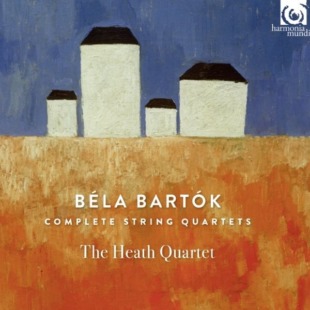
Béla Bartók Complete String Quartets on Harmonia Mundi
This is a major release. Last year I heard the Heath Quartet play Bartok’s Third Quartet in concert and was struck not only by their obvious mastery of Bartok’s idiom but also by the exuberant sense of fantasy – indeed, joy – that they brought to the music…they have a powerful understanding of t he music’s structure, coupled to superlative technical skill. …Newcomers to the Bartok quartets will find this a sincere, imaginative and splendidly played entry point; old hands will quickly find 101 new reasons why these extraordinary work rank among the supreme achievements of 20th-century music.
Richard Bratby, Gramophone, September 2017
This complete cycle of the six Bartók sting quartets finds the Heath Quartet at the top of its game… The string tone throughout… is flawless, and ensemble work is exemplary… If there were any argument for yet another recorded cycle of the Bartók quartets entering a crowded market, this is it.
Matthew Rye, The Strad, August 2017
The true joy of this survey by the Heath Quartet, taken from live recordings at the Wigmore Hall, is the pungency of performances that capture the essence of Bartók, from the desperation of youthful, unrequited love in the First Quartet, to the anguish of the last, written as war loomed. There is a freshness and immediacy running through every performance which informs the bold modernism of the Third Quartet, notably the feverish, folkish urgency of its final movement, and the surreal language of the Fifth. This is a substantial achievement by the Heath Quartet, which offers new insights into one composer’s fascinating body of work.
*****
Ken Walton, The Scotsman, 12 June 2017
A fine achievement – the end of the last quartet, No 6, is quietly devastating.
Andrew MacGregor, BBC Radio 3 Record Review, 10 June 2017 (CD of the Week)
The unfolding of the counterpoint in the first two quartets, and whirlwind delicacy and transparency of the final section of the Third, are spellbinding. And their treatment of the deeply tragic finale of the Sixth, which never becomes lachrymose, could hardly be bettered… the totality of the set is undeniably convincing.
Andrew Clements, The Guardian, 09 June 2017
…these six works, formally ingenious, technically challenging and texturally resourceful, still stand as one of the great pillars of 20th-century art music. The Heath Quartet play each with an electrifying intensity, maintaining an irresistible impetus and negotiating abrupt character changes with aplomb.
Stephen Pettit, Sunday Times, 4 June 2017
Listen to excerpts from the discs here.